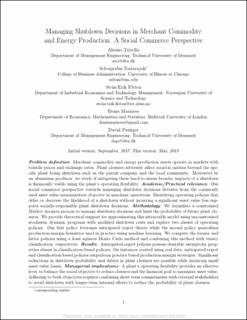| dc.contributor.author | Trivella, Alessio | |
| dc.contributor.author | Nadarajah, Selvaprabu | |
| dc.contributor.author | Fleten, Stein-Erik | |
| dc.contributor.author | Mazieres, Denis | |
| dc.contributor.author | Pisinger, David | |
| dc.date.accessioned | 2021-03-15T15:57:21Z | |
| dc.date.available | 2021-03-15T15:57:21Z | |
| dc.date.created | 2020-11-27T11:13:52Z | |
| dc.date.issued | 2020 | |
| dc.identifier.citation | Manufacturing & Service Operations Management. 2020, . | en_US |
| dc.identifier.issn | 1523-4614 | |
| dc.identifier.uri | https://hdl.handle.net/11250/2733497 | |
| dc.description.abstract | Problem definition: Merchant commodity and energy production assets operate in markets with volatile prices and exchange rates. Plant closures adversely affect societal entities beyond the specific plant being shut down, such as the parent company and the local community. Motivated by an aluminum producer, we study if mitigating these hard-to-assess broader impacts of a shutdown is financially viable using the plant’s operating flexibility. Academic/practical relevance: Our social commerce perspective toward managing shutdown decisions deviates from the commonly used asset value maximization objective in merchant operations. Identifying operating policies that delay or decrease the likelihood of a shutdown without incurring a significant asset value loss supports socially responsible plant shutdown decisions. Methodology: We formulate a constrained Markov decision process to manage shutdown decisions and limit the probability of future plant closures. We provide theoretical support for approximating this intractable model using unconstrained stochastic dynamic programs with modified shutdown costs and explore two classes of operating policies. Our first policy leverages anticipated regret theory, and the second policy generalizes, using machine learning, production-margin heuristics used in practice. We compute the former and latter policies using a least squares Monte Carlo method and combining this method with binary classification, respectively. Results: Anticipated-regret policies possess desirable asymptotic properties absent in classification-based policies. On instances created using real data, anticipated-regret and classification-based policies outperform practice-based production-margin strategies. Significant reductions in shutdown probability and delays in plant closures are possible while incurring small asset value losses. Managerial implications: A plant’s operating flexibility provides an effective lever to balance the social objective to reduce closures and the financial goal to maximize asset value. Adhering to both objectives requires combining short-term commitments with external stakeholders to avoid shutdown with longer-term internal efforts to reduce the probability of plant closures. | en_US |
| dc.language.iso | eng | en_US |
| dc.publisher | INFORMS | en_US |
| dc.title | Managing Shutdown Decisions in Merchant Commodity and Energy Production: A Social Commerce Perspective | en_US |
| dc.type | Peer reviewed | en_US |
| dc.type | Journal article | en_US |
| dc.description.version | acceptedVersion | en_US |
| dc.source.pagenumber | 20 | en_US |
| dc.source.journal | Manufacturing & Service Operations Management | en_US |
| dc.identifier.doi | 10.1287/msom.2019.0850 | |
| dc.identifier.cristin | 1853314 | |
| dc.relation.project | Norges forskningsråd: 296205 | en_US |
| dc.relation.project | Norges forskningsråd: 268093 | en_US |
| dc.description.localcode | © 2020. This is the authors' accepted and refereed manuscript to the article. The final authenticated version is available online at: http://dx.doi.org/10.1287/msom.2019.0850 | en_US |
| cristin.ispublished | true | |
| cristin.fulltext | postprint | |
| cristin.qualitycode | 2 | |
